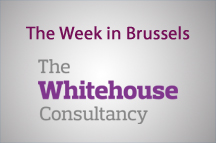 British renegotiation
British renegotiation
This week saw David Cameron travel to Brussels to gain support for his renegotiation of Britain’s membership of the European Union. On Tuesday, the Prime Minister secured agreement from the three largest political groups in the European Parliament for his package of reforms. However, the President of the Parliament, Martin Schulz, warned that there was no guarantee MEPs would back the deal and said it would not be possible to make the proposed changes legally binding before the UK referendum, widely expected to be held later in the summer.
While the UK’s demands received a broadly positive response from the Parliament, individual Member States continued to express objections, with the Visegrad countries of Poland, Czech Republic, Slovakia and Hungary resisting curbs on welfare, while France is thought to be against changes to financial regulation.
Mr Cameron also met Commission President Jean-Claude Junker. Mr Junker said there was “no Plan B” to the options currently being discussed, but stated his belief that Britain would remain a constructive and active member of the EU. The European Council President Donald Tusk, who is overseeing the renegotiation, took a less optimistic position, cautioning that talks on the draft deal were fragile and that “the risk of a break up [of the EU] was real.”
European Central Bank holds first of four monetary dialogues
 Also this week, amidst growing uncertainty in the global markets, European Central Bank President Mario Draghi gave evidence to the Economic & Monetary Affairs Committee. The session was the first of four “monetary dialogues” that the ECB President is required to hold each year with the Parliament. MEPs questioned Mr Draghi about economic growth in the Eurozone, the future direction of monetary policy, and the potential implications of the UK’s exit from the EU.
Also this week, amidst growing uncertainty in the global markets, European Central Bank President Mario Draghi gave evidence to the Economic & Monetary Affairs Committee. The session was the first of four “monetary dialogues” that the ECB President is required to hold each year with the Parliament. MEPs questioned Mr Draghi about economic growth in the Eurozone, the future direction of monetary policy, and the potential implications of the UK’s exit from the EU.
In a nod to concerns about slowing growth, the ECB chief indicated that the bank will review its monetary policy position at the next meeting of the Governing Council. He said that Eurozone interest rates are likely to stay at present or even lower levels for an extended period – a position increasingly being mooted by central banks around the world.
When asked about the impact of Brexit on economic stability with the EU, Mr Draghi said it was important that any eventual deal did not endanger the single market or hamper the ability of Eurozone countries to push ahead with deeper integration.
Bosnia submits application for EU membership
 Bosnia submitted a formal application to join the EU on Monday, having signed a Stabilisation & Association Agreement in 2008. Although 21 years have passed since the end of the Bosnian war, its economy is still mired in stagnation, while unresolved quarrels and political divisions have hindered necessary reforms. The former Yugoslav republic suffers from high unemployment and a shrinking population as many young people leave the country.
Bosnia submitted a formal application to join the EU on Monday, having signed a Stabilisation & Association Agreement in 2008. Although 21 years have passed since the end of the Bosnian war, its economy is still mired in stagnation, while unresolved quarrels and political divisions have hindered necessary reforms. The former Yugoslav republic suffers from high unemployment and a shrinking population as many young people leave the country.
Dragan Covic, the Croat member of the country’s tripartite Presidency, handed the application to the Dutch Foreign Affairs Minister Bert Koenders in Brussels and said he hoped candidate status would be granted as early as 2017. However, there is little real appetite within the EU for further enlargement, with Commissioner for European Neighbourhood Policy Johannes Hahn saying that “membership is not possible within a couple of months or even a few years.”
Bosnia is also seeking a Membership Action Plan for NATO, a step which is regarded with hostility by the country’s 1.2 million Serbs.












